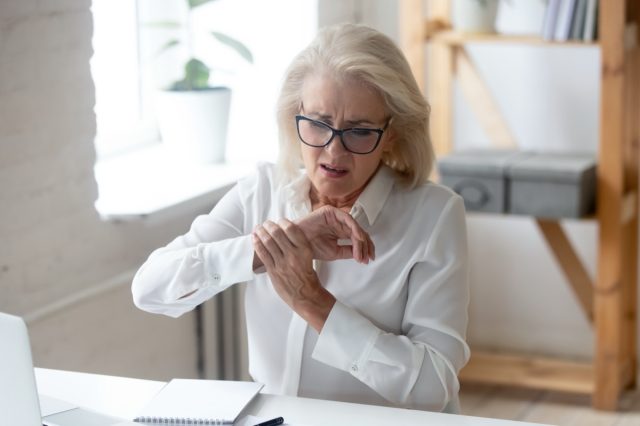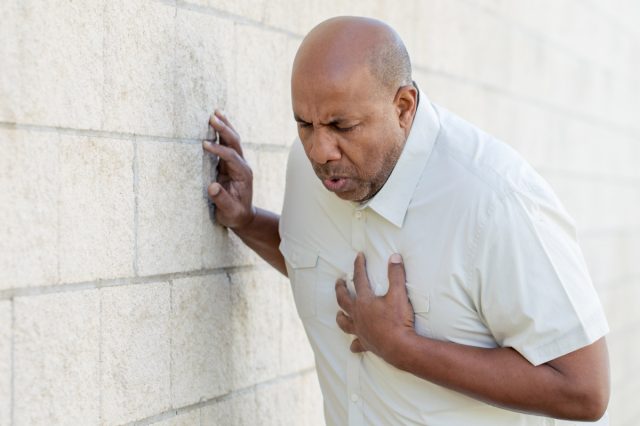Poor circulation is a common problem that isn't just uncomfortable–it can greatly affect your overall well-being and if left untreated can lead to serious complications like stroke, blood clots and heart failure. Although poor circulation can frequently occur, especially in people over 40, there are ways to lower the risk. Eat This, Not That! Health spoke with experts who share why poor circulation happens and warning signals to watch out for.
Why Your Circulation System is Important

Dr. Bayo Curry-Winchell, Urgent Care Medical Director and Physician, Carbon Health and Saint Mary's Hospital says, "Simply put, your body relies on it. Without it, your body cannot receive oxygen-nutrient rich blood."
Why Poor Circulation Happens

Dr. Curry-Winchell shares, "There are several things that can cause poor circulation. Oftentimes the onset is due to an underlying chronic health condition that has reduced blood flow throughout the body. It's important to remember poor circulation (decrease in blood flow) is a response to a condition or disease. In order to treat it, you need to find out why it's happening. The best thing to do is reach out to a health care provider for an evaluation which can help identify the cause."
Kuldeep Singh, MD, Associate Chief of Vascular Surgery at Staten Island University Hospital adds, "Poor circulation happens over time as one ages. Smoking, diabetes and kidney dysfunction can also cause poor circulation."
What Poor Circulation Can Feel Like

Dr. Curry-Winchell shares, "My patients often report a wide range of symptoms! Some of the most common symptoms reported are numbness (loss of feeling/sensation), tingling, skin changes, pain and sores that are slow to heal. Another condition to mention is Raynaud's disease which causes blood vessels to restrict (narrow) which is accompanied by pain and discoloration (most commonly) to the nose, ears, hands and feet appear pale or bluish in light skin however, in darker skin this presentation might not present in this fashion."
Dr. Singh states, "You can develop pain in the legs, abdomen, and heart. You can even suffer from stroke because poor circulation can affect the blood vessels that supply your brain."
Who is at Risk?

According to Dr. Curry-Winchell, "Anyone can be at risk of poor circulation. However, if you have an underlying health condition such as diabetes, heart disease, or smoke tobacco — you are at an increased risk of developing peripheral artery disease."
Dr. Singh says, "Those who smoke, patients over 65, those who don't control their diabetes, those who are affected by kidney dysfunction."
How to Help Treat Poor Circulation

Dr. Curry-Winchell shares, "Once a health care provider has identified the cause of the poor circulation options such as special exercises, compression stockings, medications, or surgical intervention is sometimes needed for varicose veins can be implemented. In the case of Raynaud's disease, exposure to warm temperature or treatment of the underlying disease or condition can often help restore circulation."
Dr. Singh advises, "First and foremost, stop smoking. See a vascular surgeon who can check on your arteries and veins. Lose weight and control diabetes."
Warning Signs Your Body Is Trying to Tell You About Poor Circulation

Dr. Curry-Winchell reveals, "You may experience a variety of symptoms such as loss of sensation, change in temperature, (coldness), cramping, hair loss, skin changes such as (glossy or shiny appearance or sores) in your extremities such as fingers, hands, arms, legs, feet, or toes. Males may have trouble getting an erection." Dr. Singh says, "You will develop pain when resting or when doing an activity. You will develop hypertension. You will develop dizziness and vision changes. You can develop pain in your chest."
No comments:
Post a Comment